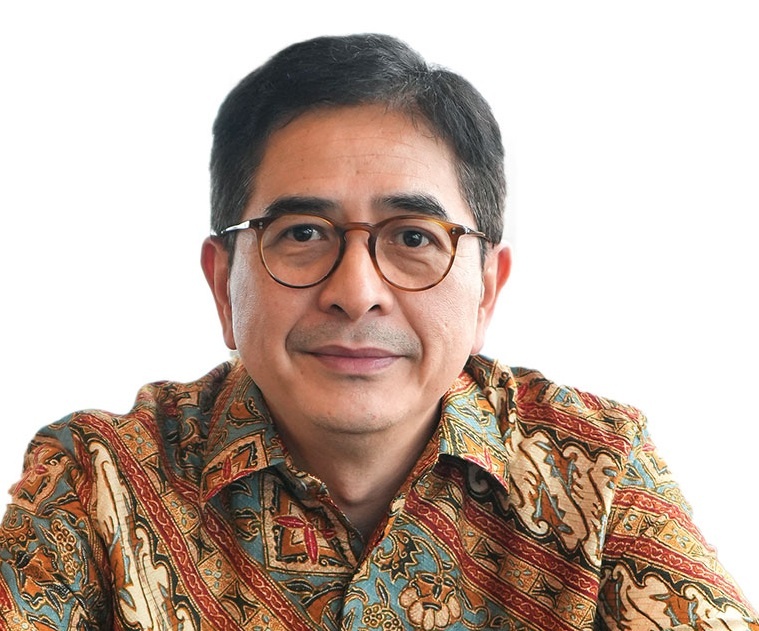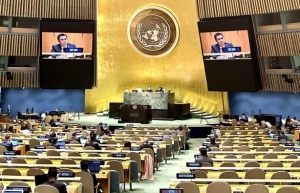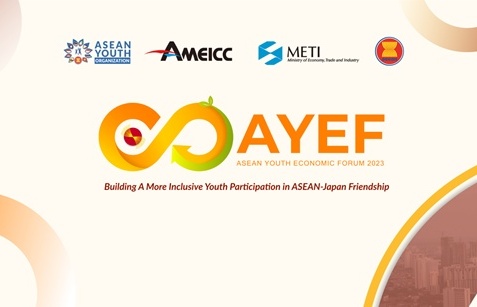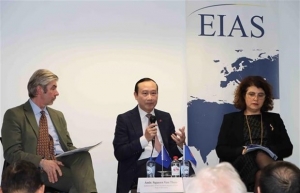Vietnam can enhance its role further within ASEAN
We are facing a challenging business environment on a global scale. How do you evaluate the support the ASEAN Business Advisory Council (ASEAN-BAC) has and the wider Vietnamese business community?
 |
| Arsjad Rasjid, chairman of ASEAN BAC 2023 |
In our country we have something called Indonesia Incorporated, where the government and the private sector work together. This is very important and, at the ASEAN level, we should have an ASEAN Incorporated, where the governments and the business community work together.
This is because there are multiple challenges. For instance, we have 280 million people in ASEAN. If we didn’t have the public and the private sectors working together, we would not have been able to solve issues like carrying out mass vaccinations during the pandemic.
If we work together on ASEAN connectivity, on energy for example, we can maintain our security with this synergy. We are a $3.2 trillion economy. However, with more efforts towards ASEAN incorporated, we can contribute more to the world than the EU or the US itself. That’s why centrality must happen. This is important to overcoming the challenges that we face globally today.
How do you assess the role of Vietnam in realising the ASEAN-BAC agenda?
If we can align our voices together, we will see many synergies. For example, on food security, Vietnam is fairly advanced. Then we also have the challenge of climate change, yet we can connect and help each other on this too.
Vietnam has secured the highest economic growth and exports worldwide in the bloc. But we do not always work together for this reason. For example, Vietnam may import tuna from Europe, but why not from Indonesia? We have many neighbours, and if we work together, ASEAN would become stronger despite geopolitical changes.
For example, there were some policy changes in China a couple of weeks ago, then there will be an election in the US next year, and more besides. So, in all these situations, it is important for us to combine synergies to stand against global headwinds.
In your view, what initiatives can be put forward between Indonesia and Vietnam to drive ASEAN centrality?
The ASEAN QR code is a good initiative to show payment system connectivity. Another one is that we work on the so-called harmonisation of company ID, for example, so that Vietnamese companies find it easier to provide access to Indonesia and vice versa, but we must conduct a pilot first. As long as we move forward in this, it will boost trade and investment. If we can manufacture the base substances for medicine together, in another example, we can show collectivity what is important for all.
This is not only important for the people, but is also quite good for businesses. Something, like electric vehicles, is also important. We can build them ourselves because we have the components and minerals in ASEAN, except maybe for lithium, but in that we can work with Australia or Africa to create forward movement. But we must work together.
How should we bolster Vietnam’s role in ASEAN?
The relationship we must build is business-to-business (B2B), not just government-to-government. For example, via creating legacies and stimulating participation of firms in legacy projects, we can interact and know each other better because it’s very difficult to go on just agreements alone. Participation of Vietnamese companies in legacy projects is crucial.
Vietnam’s voice in ASEAN is also important. Vietnam should voice more on business in ASEAN and participate more. We expect the Vietnamese government to have more dialogue between businesses and the government, between ministers and business, because though any agreement is signed by the government, ultimately it will be implemented by businesses.
So, businesses should participate more, as they are the ones who understand what’s actually needed. The business voice of Vietnam is critical.
How can we boost trade ties between Indonesia and Vietnam?
Looking at current trading activities between Vietnam and Indonesia, most of the trade is with traditional commodities, like coal or automotives. We have to move beyond that, and that’s why we refer to digital transformation. We have to think about how to create IT business or digital business between Vietnam and Indonesia. We need to have different trades and different sectors, not just the traditional sectors. I believe our trade value is not just going to reach $18 billion, but can be doubled because we can create complementary business. Vietnam and Indonesia have a very close relationship. Even our independence days are only two weeks apart. We respect each other and want to work together.
One of our business groups in Indonesia, Ciputra, set a foothold in Vietnam at the very beginning. We also have another company from Indonesia, Japfa, in the poultry business here. We would like to see more investments from Indonesia to Vietnam, and vice versa.
In September this year, we will have the ASEAN Business Investment Summit and ASEAN Business Awards, when we will be inviting many Vietnamese companies to come to Indonesia. We aim to create a B2B roundtable, while inviting the Vietnamese prime minister to participate in the conversation so that we can see more business between us.
| Launched in 2003, ASEAN-BAC was set up with the mandate to provide private sector feedback and guidance to boost the bloc’s efforts towards economic integration. As Indonesia assumes ASEAN Chairmanship this year, the Indonesian Chamber of Commerce and Industry (KADIN) simultaneously leads ASEAN-BAC 2023. KADIN chairman Arsjad Rasjid has officially taken on the role of ASEAN-BAC president for 2023. This year’s theme is ASEAN Centrality: Innovating Towards Greater Inclusivity, with five key focus areas: digital transformation, sustainable development, trade facilitation, health resilience, and food security. The event carries the 5Ps of Peace, Prosperity, People, Planet, and Partnership as fundamental values throughout its activities. During the Indonesia ASEAN-BAC presidency, several legacy projects will be developed to drive economic growth and development in the region across the five focus areas. |
 | Vietnam pledges to closely cooperate with ASEAN, UN in supporting Myanmar As a member of ASEAN and the United Nations Human Rights Council for 2023-2025, Vietnam will continue its close coordination with the 10-member grouping and the international community to help Myanmar overcome difficulties, promote dialogues, enhance understanding and narrow differences, the Permanent Representative of Vietnam to the UN has said. |
 | ASEAN-Japan economic partnership in next decades discussed A blueprint that sets the future direction of the ASEAN-Japan economic partnership for the next decades is now under discussion. |
 | Vietnam calls for stronger ASEAN – EU relations Vietnam is willing to share its experience as well as work closely with other ASEAN member countries to continue promoting the ASEAN-EU strategic partnership, a Vietnamese diplomat has said. |
What the stars mean:
★ Poor ★ ★ Promising ★★★ Good ★★★★ Very good ★★★★★ Exceptional
Related Contents
Latest News
More News
- Citi economists project robust Vietnam economic growth in 2026 (February 14, 2026 | 18:00)
- Sustaining high growth must be balanced in stable manner (February 14, 2026 | 09:00)
- From 5G to 6G: how AI is shaping Vietnam’s path to digital leadership (February 13, 2026 | 10:59)
- Cooperation must align with Vietnam’s long-term ambitions (February 13, 2026 | 09:00)
- Need-to-know aspects ahead of AI law (February 13, 2026 | 08:00)
- Legalities to early operations for Vietnam’s IFC (February 11, 2026 | 12:17)
- Foreign-language trademarks gain traction in Vietnam (February 06, 2026 | 09:26)
- Offshore structuring and the Singapore holding route (February 02, 2026 | 10:39)
- Vietnam enters new development era: Russian scholar (January 25, 2026 | 10:08)
- 14th National Party Congress marks new era, expands Vietnam’s global role: Australian scholar (January 25, 2026 | 09:54)

 Tag:
Tag:



















 Mobile Version
Mobile Version